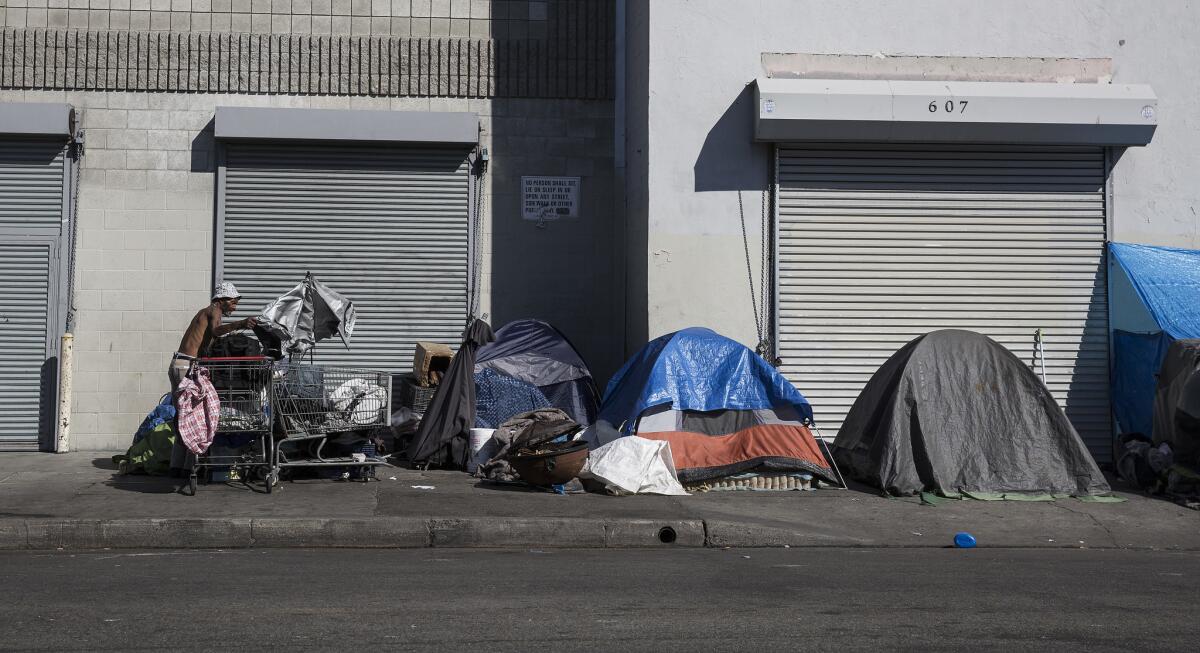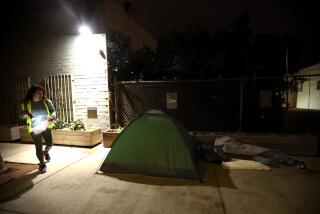Report on L.A. city homelessness plan gives a sobering picture of the struggle ahead

Nine months after the Los Angeles City Council unanimously adopted a comprehensive plan to end homelessness, the first progress report on the plan, released this week, offered a sobering picture of the long and difficult path ahead.
Proposals for storage lockers and toilets for street dwellers are stalled, new shelter capacity is being added at a trickle, and the city bureaucracy moving more slowly than some council members had expected.
âI donât get that. Thereâs so much red tape and process in that, â Councilman Michael Bonin said of an item in the report citing a study of shared housing. âIf there are beds available today, I would like us to be moving on it.â
The news wasnât all bad.
Voters on Tuesday overwhelmingly approved Proposition HHH, a bond proposal the City Council placed on the ballot to authorize $1.2 billion in borrowing for homeless housing. The bond program, however, is the long-range element of the plan.
Among its 64 strategies, many involved procedural changes whose effects will be hard to measure. Among them are a âcontact cardâ for police to get homeless people into the services system, training of outreach workers to serve jail inmates and a request for proposals to improve the homeless database system.
More urgent remedies â getting assistance to the thousands of people living on the cityâs sidewalks â have met disappointments.
Community opposition has stalled efforts to build storage facilities for homeless peopleâs property in Venice and San Pedro, the report said. The San Pedro site has been abandoned. A mobile storage alternative is now being considered for the Venice site.
Plans to provide mobile showers have also hit roadblocks. One mobile shower company is working to launch operations this month but declined to become a city contractor. Other contractors are being sought, the report said.
Several items requiring City Council approval are moving slowly. Measures to create parking zones for people living in vehicles and changes to the planning codes to speed the approval of housing are still months in the future.
As the first attempt to bring order and accountability to the wide-ranging strategies proposed by City Administrative Officer Miguel Santana, the report generally won praise from members of the Councilâs Homelessness and Poverty Committee who reviewed it Wednesday.
But Bonin expressed frustration with the pace of progress. When told that 254 new crisis beds had been provided, Bonin said he could not measure that figure against a goal and timeline.
âIâm hopeful, since much of the housing approved [under Proposition HHH] isnât going to come on line in a few weeks or months, that these numbers dramatically escalate over time,â he said. âIf weâre looking at 28,000 people, 254 is really inadequate. Iâd like to see how these plans are going to ramp up so we can get that unsheltered number down.â
During a back-and-forth at the committee hearing, Bonin also chided city staff over delays in providing services to people living in vehicles.
Analyst Jason Killeen of the City Administrative Office said a survey of the estimated 3,900 people living in vehicles would be required to develop a program of services for them.
âHow much data do you need?â Bonin asked. âHow many do you need to survey to craft a program?â
Killeen said that the California Environmental Quality Act would require the city to provide the data.
âI donât think that requires us to interview every person in a vehicle,â Bonin said.
While much of the progress described in the plan was procedural, involving the streamlining of diverse homeless activities, there were several concrete achievements:
The city received proposals from 49 developers to build permanent supportive housing on 12 city-owned parcels. Santana said a list of those selected will be announced next week.
A study has been completed on a proposed tax on new residential and commercial developments based on the estimated demand for low-income housing they will create. The so-called linkage fee, estimated to raise up to about $1 billion over 10 years, would have to be approved by the City Council.
The Los Angeles Police Department established four teams to work with homeless people. Nearly 800 officers have received mental health intervention training.
Medical services personnel in city jails are now collecting information on homelessness, mental health and veteran status.
The city allocated $10.8 million to fund 550 crisis and bridge housing beds and case management for about 2,300 people.
The Los Angeles Housing Authority has established an incentive program to provide landlords up to $1,100 to hold apartments for housing voucher holders while mandatory inspections are being done.
A pet services center opened on skid row in September, and the Animal Services Department has applied for funding to provide alternative housing, including tents, for homeless people with pets.
The Hilton Foundation and other philanthropic groups contributed $20 million to build the cityâs supportive housing loan fund to $65 million.
The position of homeless coordinator was filled. In October the Homeless and Poverty Committee announced the selection of Meg Barclay, a veteran of nonprofit, federal and City Hall housing programs.
She will work with Los Angeles County and nonprofit agencies to tie the cityâs work into a regional structure. Her first assignment was completion of the progress report.
Twitter: @LATDoug
ALSO
Protesters march through Los Angeles in fourth night of anti-Trump demonstrations
L.A. voters make bold bets with new taxes for transit, homelessness
Success of homelessness and transit measures could give L.A. Mayor Eric Garcetti a boost
More to Read
Sign up for Essential California
The most important California stories and recommendations in your inbox every morning.
You may occasionally receive promotional content from the Los Angeles Times.











